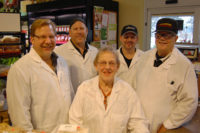Almost 100 years ago, a German sausage maker came to the United States in search of a better life for himself and his family. He did — and how. The little deli meat business that Gottlieb Dietz started up when he bought out Walter Watson’s ham business has grown to be one of the country’s top privately owned deli processors. Dietz & Watson is turning 75 this year, and after all the growth and evolution the company has seen, it still prides itself on handcrafted, premium meats and cheeses.
Dietz & Watson produces a wide variety of deli meats, cheeses, franks and sausages — more than 300 items from its Philadelphia headquarters alone. The company is also the last Philadelphia manufacturer of scrapple, a regional specialty. Additionally, it produces chicken and turkey items from a plant in Baltimore, and it has a cheese-making facility in Corfu, N.Y. Its hot dogs, hams, roast beef products, turkey products, cheeses, etc. are distributed nationwide to retail customers, including supermarket chains, club stores, and independent retailers.
Four generations of the Dietz family have contributed to the company’s long success, and three generations are still active in the business. Ruth “Momma” Dietz, Gottlieb’s daughter, is the company’s matriarch, chairwoman and spokesperson. She has been with the company almost since the very beginning and, at 89 years old, is in the office every day — when she’s not on the road promoting the product.
The third generation of the family is represented by her three children: Louis Eni, CEO; Chris Eni, chief operating officer, and Cindy Eni Yingling, chief financial officer. The youngest generation includes Lauren Eni, Louis’ daughter, and Chris Yingling, Cindy’s son. There are still more family members in college, Louis adds.
“They’ll be here soon,” he says, laughing.
Momma Dietz’s children grew into their roles naturally. Chris is a mechanical engineer and oversees the continual expansion and changes in the company’s three plants. Cindy oversees the financial side of the business, and Louis has been involved on the marketing and product development side.
“Obviously there has been a tremendous amount of growth since we’ve been involved, and part of the reason is that we complement each other so well,” Louis says. “We really work well together. All of us, including Mom, are involved in all of the major decisions. We have our jobs, but we also have mini-board meetings to make decisions when it’s necessary.”
Dietz & Watson’s growth in recent years has largely come from national expansion. The company has large shares in Eastern and Midwest markets like Chicago and Pittsburgh, and it has grown in Western markets, including major cities in California and Texas.
“There is strong consumer demand. It’s all about distribution,” Louis says. “We’ve added independent distributors in many, many markets, and we’ve added new supermarket customers.”
Entering into a new market for any type of product is a difficult and expensive venture, and more so for a company like Dietz & Watson, which offers a premium product that is typically more expensive than its competition. Much of the company’s marketing work comes at the store level, by way of product sampling.
Momma Dietz has taken on an unexpected role in the company’s marketing efforts. She has become the face of the company, appearing in the company’s advertising as well as making public appearances all over the country. The idea came about when the company’s agency met her during a company tour and realized that nobody epitomized the company and its values as well as she does.
“She’s a natural,” says Steve Riley, marketing director. “You see other companies using the matriarch or the patriarch of the family as spokesman. I don’t know how many of them are real, but she’s here every day. She knows more than anyone else about the company and its founding.”
“They sent us pictures of these other models, and she said, ‘We’re not going to get someone else to do it!’” recalls Cindy. She travels with her mother about once a month to a different supermarket to promote the products.
“She’ll work the front of the deli case, and she’ll sign hats, and people line up, to get their picture taken with her,” she says.
An added benefit, Riley notes, is that more people in Philadelphia have become more aware of the company’s local roots.
“The company has been here 75 years, and people weren’t aware of how local we were until we started doing it,” he says. “Some people didn’t even realize that we were from Philly, they were so focused on the business and selling product.”
Momma hasn’t let her new-found fame go to her head.
“I was just so old, they felt sorry for me and put my picture up,” she jokes. “I love it, though. Getting to meet Dietz & Watson’s customers and consumers face to face is the highlight of the job.”
Old traditions in the modern era
Dietz & Watson still operates under many of the guiding principles set by Gottlieb Dietz. The company’s Philadelphia plant, the largest of its three, relies on a considerable amount of handwork.
“We want our products to be produced in the Old World style, so we have a lot of employee involvement, a lot of hand labor,” explains John Capra, product development/quality assurance.
For instance, each hot dog line has a person visually inspecting each hot dog that comes down the line prior to packaging. If any product is defective, it’s taken off the line and replaced with a better one. Spices are applied by hand, and Virginia hams are hand-coated.
Capra says that each employee is expected to become a product expert, so they come to learn what is expected of each hot dog or deli log. With so many eyes looking over each item, only the best products actually make it to the packaging lines.
“Most of our employees, it takes them at least a year to really learn the job and what they have to do, to understand what the product looks like and what the expectations are for the product,” he adds.
The company is not adverse to technology; in fact, its newest slicing line uses robots to pack off the packages of deli meat. Louis notes that the company is willing to invest in technology when it’s needed, but he adds that the company will not become dependent on technology or allow it to affect the product quality.
“There isn’t a way to automate quality,” he says. “If it has to be done by hand, it’s going to be done by hand.”
The company has been in its Philadelphia headquarters since 1975, and the building has tripled in size to about 250,000 square feet since then. It employs about 500 people in that facility and about 1,000 overall. Its Baltimore plant, which is 125,000 square feet in size, was acquired from the former Parks Sausage Co. The poultry processing department was relocated out of the Philadelphia facility and into that plant in 1999. The company has plans to expand both facilities soon.
Dietz & Watson has long distributed cheese products as well, but it started its own cheese manufacturing business about eight years ago in order to provide some tastier alternatives than the usual deli fare of American, Swiss or provolone. For instance, one of the company’s best-selling roast beef items is a London Broil, which is a top round marinated with garlic and lemon and proprietary spices. That product and others like it that provide a bit more flavor than the typical deli meat deserve a cheese that complements it. The company’s Horseradish Cheddar Cheese partners very well with the London Broil.
“That’s one of my jobs as Momma Dietz,” Momma says about her promotional appearances. “When they buy the roast beef, I tell them that we also have a horseradish cheese that would be delicious with it, and they buy that too.”
Along with providing a large product portfolio, Dietz & Watson has also been an industry leader in making good-for-you deli products. It was making low-sodium items in the 1980s, well before it became a trend.
“My father had a heart attack at my college graduation,” Cindy recalls. “He got out of the hospital and went to a cardiologist, and they said he had to lower his salt intake. The first thing he did was come in here, get everyone together and said, ‘Let’s start making products with lower salt.’
Many of the company’s products are labeled to indicate low-sodium, gluten-free, nitrate-free or diabetic-friendly choices. Dietz & Watson products also appear on the Feingold Association’s list of foods safe for hyperactive children and people with sensitive diets.
While maintaining low sodium levels does drive the company’s research and development efforts, it is not the sole factor. Every Dietz & Watson product has to taste good, as well as be good for you. The company’s dedication to healthy products has paid off in terms of sales.
“Our Gourmet Lite turkey breast and ham, if they’re not the largest sellers in their categories, they’re in the Top 2 or 3,” Louis remarks.
Despite the fact that Dietz & Watson could easily fill an entire deli case with its products, the company leaves part of the space open by design.
“We would relish the chance to share a deli case with anybody,” Louis says. “We’ll leave space for competitive items when we go into a new market, because we know we’re going to get our share of the business and because consumers deserve and need choice.
“The fact is, some in the premium deli business have become known for demanding exclusivity in the deli case, but our motto has always been and still is that we would rather share space in every single deli case than be excluded from one of them,” Louis added.
The deli case can be a very competitive area of the store, due to the fixed size and the number of competing companies, but Dietz & Watson has done very well when there is open competition. Riley points out that the company has done a Deli Challenge, which puts up one of the company’s meats against a similar product by a competing brand.
“We win at least 85% of the time. We’re not afraid of the competition and want to let the consumer decide,” he says.
The company even commissioned a consumer study from the Academy of Food Marketing at St. Joseph’s University, which found that consumers prefer to have a choice in brands in every section of the grocery store.
“We know that it’s better for the consumer to offer choice, and that’s how we go to market,” Louis says.
Overcoming adversity
As with any company that has 75 years’ worth of history, there are some high points and low points. One of the lowest points in recent memory came over the Labor Day weekend in 2013, when a fire destroyed Dietz & Watson’s central distribution facility in Delanco, N.J., which contained much of the company’s inventory. Though the recovery has taken time, Louis maintains a positive outlook.
“It was a devastating nightmare that I think in the end is going to make us stronger,” he says.
The fire occurred the day before Labor Day, and even though the next day was a holiday, many employees voluntarily showed up to work to make product.
“We have amazing employees,” Cindy notes. “People worked around the clock. We gave them an extra day’s pay, and people wanted to give it back.” She adds that the industry as a whole, including customers, suppliers and even some competitors, stepped up to offer the company whatever was needed.
The warehouse was a very sophisticated, state-of-the-art facility, and the fire reduced employees to filling out orders on paper, like it was done back in the old days. Nevertheless, the company was committed to serving its customers and was back to shipping product within days.
Dietz & Watson has re-established its normal shipping processes, using some additional warehouses plus some capabilities at its Philadelphia plant. Louis said that the company will be rebuilding the distribution center, though the location had not been decided as of press time.
With the prospects of new construction, plus expansion to its existing plants and continued growth across the country, the family members have plenty on their plates. Nevertheless, they are taking advantage of the 75th anniversary to reflect on the company’s legacy while thanking its customers.
Earlier this year, Dietz & Watson launched a food truck to travel from Philadelphia to 25 of its key markets across the United States. At every stop, the truck will park at a supermarket, and celebrity chef Steve ‘Chef Roc’ Cassarino will prepare entrees using Dietz & Watson products. Each recipe is tailored to the palate of the area and includes everything from gourmet sandwiches to tortilla soup.
Retailers will also be offering Dietz & Watson deli products at a special price to attract consumers into trying them. Louis acknowledges that, as a manufacturer of premium deli products, Dietz & Watson will never be the lowest-priced product in the deli case.
“We have a philosophy that if we’re making a roast beef or a chicken or turkey breast, then it’s going to be the best that can possibly be made. It will be the best tasting, freshest, highest quality and made with the best ingredients that you can find anywhere in the industry,” he says. “Nothing is made to a price. We don’t ever make a product based on a certain pricing formula.”
After 75 years, that philosophy is clearly working.












